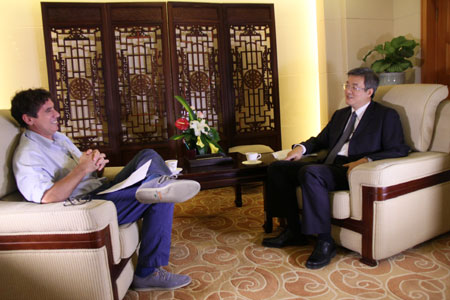
People’s Republic of China



On August 27, 2015, Director-General of the Department of Latin American and Caribbean Affairs of the Foreign Ministry Zhu Qingqiao gave an interview to Argentine State TV, answering questions concerned by the reporters such as China-Latin America and China-Argentina relations.
Zhu Qingqiao said that the Latin American and Caribbean countries are an important part of developing world and global emerging powers, and their roles are becoming more and more prominent under the background of deep adjustment of the international configuration. The Chinese government pays high attention to China-Latin America relations. President Xi Jinping has paid two visits to Lain America and had meetings with leaders of all regional countries that have established diplomatic relations with China. When President Xi Jinping was paying his second visit to Latin America last July, the first China-Latin America and the Caribbean Summit was successfully held, during which he put forward the "1+3+6" new framework for China-Latin America practical cooperation and the "Five in One" new pattern for constructing China-Latin America relations. Both sides announced to build a comprehensive cooperative partnership featuring equality, mutual benefit and common development, and decided to establish the Forum between China and the Community of Latin American and Caribbean States ( CELAC). Premier Li Keqiang successfully visited Latin America this May and further proposed a "3x3" new model for China-Latin America production capacity cooperation. The above-mentioned initiatives were widely welcomed and warmly responded by the Latin American and Caribbean countries.
Zhu Qingqiao stressed that China-Latin America cooperation constitutes an important part of South-South cooperation and boasts a sound foundation for political relations and a strong advantage of economic complementarity, and aims to realize common development as it is in the fundamental interests of both sides. China-Latin America cooperation is open, transparent and inclusive and targets no third party, which not only benefits peace, stability and development in Latin America and the Caribbean but also improves exchanges and cooperation between the Latin American and Caribbean countries and other countries and regions.
In regards to China-Argentina relations, Zhu Qingqiao expressed that Argentina is a major country in Latin America and an important emerging market. China regards Argentina as a vital link in its overall diplomacy especially its relations with Latin America. President Xi Jinping and President Cristina Fernandez de Kirchner successfully visited each other's country last July and this February. The two countries have established the comprehensive strategic partnership and bilateral relations are advancing at a higher level with strategic and overall connotations being gradually enriched.
Zhu Qingqiao noted that China-Argentina relations can only grow better, and China very much looks forward to the development of bilateral relations and will, together with Argentina, keep the momentum of high-level exchanges, constantly strengthen practical cooperation in fields such as energy, mining, agriculture, finance and infrastructure, and meanwhile further boost coordination in such important international and regional affairs as global economic governance and the UN reform, so as to safeguard the overall interests of vast developing countries and emerging markets.
Zhu Qingqiao also introduced the reform of RMB exchange rate, and emphasized that the reform is an adjustment to improve the forming mechanism of RMB market. Currently, China maintains a stable and relatively rapid economic growth with sufficient foreign exchange reserve and multiple measures to control and adjust the economy, therefore, there is no foundation for RMB to depreciate on a sustained basis and it will still be basically stable at a reasonable and balanced level. China's currency policy adjustment and reform measures fully accommodate concerns of all parties. The Chinese government believes that China will make greater contribution to world economic growth by adjusting to the new normal and keeping financial stability through market-oriented reforms.


